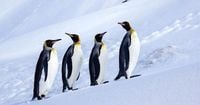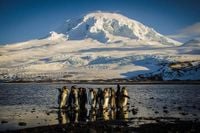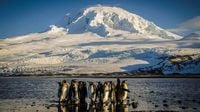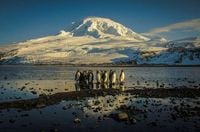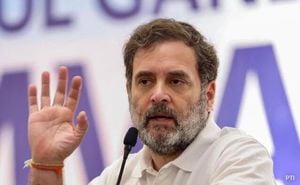On April 2, 2025, President Donald Trump made headlines by imposing a 10% tariff on the Heard and McDonald Islands, a remote Australian territory located in the southern Indian Ocean. This unexpected move has sparked discussions about the implications of tariffs on uninhabited territories, especially those that play significant ecological roles.
The Heard and McDonald Islands, known for their rich biodiversity, are home to large populations of penguins and seals, making them a crucial area for ecological research and conservation. Despite their lack of human inhabitants, these islands are considered one of the most pristine ecosystems on the planet, with no known species introduced by humans. This unique status enhances their importance in international discussions surrounding wildlife protection and environmental preservation.
Trump's announcement of the tariff came during a press conference where he unveiled a broader strategy of reciprocal tariffs aimed at various global trade partners. The list included not only the uninhabited islands but also regions such as the British Indian Ocean Territory and the Cocos (Keeling) Islands, both known for their minimal populations and limited economic activity.
The decision to impose tariffs on the Heard and McDonald Islands has raised eyebrows, particularly given that these territories generate virtually no economic activity outside of limited Australian commercial fishing. As noted by various analysts, there is skepticism regarding how such tariffs will impact these remote locations, which are primarily valued for their ecological significance rather than economic output.
According to reports, the tariff on the Heard and McDonald Islands is part of a larger initiative that includes substantial tariffs on countries like China, which faces a staggering 34% tax on imports, alongside 20% tariffs on the European Union and Great Britain. This aggressive tariff strategy aligns with Trump's ongoing trade war narrative, which aims to assert U.S. economic dominance globally.
During the press conference, Trump stated, "We will charge them approximately half of what they are and have been charging us, so the tariffs will be not a full reciprocal." This rhetoric suggests a strategy of leveraging tariffs as a means to negotiate better trade terms with other nations.
Environmental experts have expressed concern over the implications of such tariffs, particularly as they relate to international agreements like the Antarctic Treaty. This treaty promotes international scientific cooperation and prohibits any country from claiming ownership of land in Antarctica. While Australia administers the Heard and McDonald Islands, their inclusion in the tariff list may be perceived as a breach of this international spirit.
Further complicating the situation, the Australian Antarctic Division, which manages the islands, has yet to provide a comprehensive response to Trump's tariff announcement. The islands, which span approximately 37,000 hectares, are characterized by their rocky terrain and glaciers, with Heard Island being volcanically active. They are primarily accessible by sea, which adds to their remote nature.
As the world watches the unfolding consequences of these tariffs, the response from environmental and geopolitical experts will likely shape future discussions on international trade and ecological conservation. Elizabeth Buchanan, a polar geopolitics expert, remarked, "One could argue this is in breach of the international Antarctic spirit," highlighting the tension between national policies and global environmental commitments.
Social media reactions have ranged from bewilderment to ridicule, with many users questioning the logic behind taxing islands with no human population. One user humorously noted, "The Trump administration has put a 10 percent tariff on the Heard Island and McDonald which has a population of 0 people and is inhabited only by penguins." Such comments underscore the absurdity perceived by the public regarding the administration's approach to trade policies.
As the situation continues to develop, it remains unclear how these tariffs will affect the islands and their ecosystems. The Australian government has been proactive in monitoring the waters surrounding the Heard and McDonald Islands as part of Operation Resolute, which aims to address security threats such as piracy and pollution.
In conclusion, the introduction of a 10% tariff on the Heard and McDonald Islands reflects a broader trend in Trump's trade policy that seeks to assert U.S. dominance on the global stage, even in the most unexpected corners of the world. The ecological significance of these islands, combined with the complex international implications of such tariffs, raises critical questions about the future of trade and environmental stewardship.
